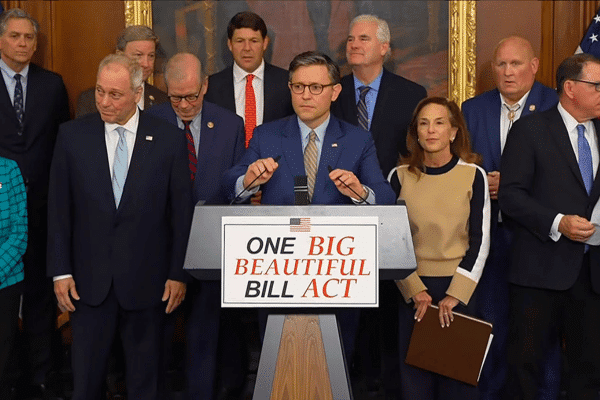
Early on Saturday morning, the Senate released the text of its 940-page bill, then voted just after 11:00 p.m. on a motion-to-proceed, which allows the Senate to begin debate on the bill. The procedural vote included two Republican defections, Senator Rand Paul (R-KY) who has stated emphatically he will not support the package due to debt and deficit concerns, and Senator Thom Tillis (R-NC), who has expressed concerns about the bill’s Medicaid reforms. After voting against the motion-to-proceed, Tillis announced he will not seek re-election in 2026, and he is likely to vote against final passage of the bill, stating that he now has “pure freedom to call the balls and strikes as I see fit.”
Republican lawmakers had already faced major setbacks over the past week after significant portions of the package were removed for violating the rules of the reconciliation process. The Senate parliamentarian struck multiple provisions tied to Medicaid, immigration, ACA premium assistance, and limits on state use of provider taxes. The Medicaid ruling would eliminate more than $250 billion in projected savings from the package, complicating the budget math for lawmakers to offset the tax cuts in the package. Additionally, the measure to delay enforcement of the federal nursing home staffing mandate was removed from the package, as only portions of regulations that are already in effect may be included in reconciliation, according to the parliamentarian’s ruling. The parliamentarian is a non-elected position of the Senate who is tasked with ensuring compliance with the Senate’s rules.
The vote-a-rama taking place today allows an unlimited number of amendments to the bill to be offered on the floor. This is often used by the minority party to slow down the process and also force members of the other party to cast difficult votes that can be used against them in future elections. However, the end of the vote-a-rama typically includes a substitute amendment to override any controversial changes, which is what lawmakers will ultimately vote on.
One of the changes that may be considered is a proposed ban on state and local regulation of artificial intelligence, such as pricing algorithms for rental housing, in an effort to pause regulation until a national framework can be established. The measure was introduced by Senate Commerce Chair Ted Cruz (R-TX) and was combined with federal broadband funding to comply with the budget reconciliation rules. Several Senate Republicans, including Marsha Blackburn (R-TN), Josh Hawley (R-MO), Rand Paul (R-KY), and Kevin Cramer (R-ND) are seeking to strike the provision through an amendment.
Another area that may cause issues for the Senate package is the State and Local Tax (SALT) deduction changes differ from the House-passed version. While the Senate version retains the House’s $40,000 SALT cap, it phases it out after five years then reverts to the current $10,000 limit. This has been one of the most defining negotiation points for the House, with seven House Republicans pushing for the expanded cap and suggesting they will vote against a final package if their demands are not met; they have leverage on this issue as without their votes, a reconciliation package would not pass and the current $10,000 SALT cap would revert to prior law without a cap.
Similarly, hardline conservatives have expressed significant concerns about the package, with Senator Rand Paul the most notable to oppose the bill. Senators Ron Johnson (R-WI), Rick Scott (R-FL), and Mike Lee (R-UT) have also raised concerns about the debt and deficits within the bill, and over the weekend, the House Freedom Caucus noted that the Senate’s bill accrues “1,705% more” debt than the House version. There are currently 32 members of the House Freedom Caucus; the House can only afford to lose four votes to pass the bill should it be sent back to the House, and the vote last month to pass the bill in the House succeeded by just a one-vote margin.
By some estimates, roughly 30-40% of the Senate’s draft package differs from the House-passed version. If the Senate passes its version, it may then either negotiate with House leadership for a unified version and each chamber to then pass that package, or the two chambers may opt for a formal conference committee to negotiate their differences. The White House has pushed to complete the process by July 4; however, this deadline is only internal-facing and is non-binding. The only binding deadline for a budget reconciliation package is that it must be signed into law during the budget’s fiscal year, in this case, it must be finalized no later than September 30, 2025.
Argentum remains focused on two main priorities during this process: (1) ensuring that any Medicaid reforms do not impact Medicaid assisted living waiver programs or participants, either directly or indirectly; and (2) inclusion of tax policy to increase access and affordability of assisted living, such as the Credit for Caring Act that would provide a $5,000 tax credit to offset long-term care expenses. That provision is not currently included in the legislation; however, both the House and Senate have included tax deductions for seniors ($4,000 annually in the House version and $6,000 annually in the Senate version).
For more information on major elements in the Senate’s draft package, click here.
